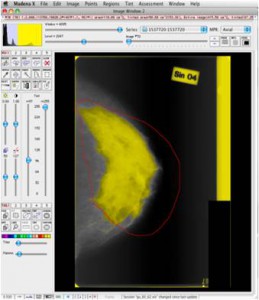October was Breast Cancer Awareness Month and on October 26th superheroes from the London offices of BioMed Central and Springer participated in the Wear it Pink (WiP) day. Together we raised £222.29 to help the Breast Cancer Campaign continue researc h into improving treatment and finding a cure for the (more than) 48,000 people diagnosed each year with breast cancer. Even our mascot Gulliver joined in the fun…
h into improving treatment and finding a cure for the (more than) 48,000 people diagnosed each year with breast cancer. Even our mascot Gulliver joined in the fun…
As Gulliver pointed out in his blog, WiP day fell right in the middle of Open Access Week. Research published during October in Breast Cancer Research, an open access journal, are all steps in understanding what exactly are the changes within a cell which cause it to behave aberrantly, and how each patient differs.
Low levels of Stat5a indicate a worse prognosis for breast cancer
Stat5 is normally involved in regulating prolactin and growth hormone in the breast. Using tissue samples a multinational team showed that levels of cellular and nuclear Stat5a (but not Stat5b) are reduced within the tumor during the progression of breast cancer and indicate an increased risk of relapse and worse outcomes.
Gene profiling of migrating tumor cells can be used to predict clinical outcome for breast cancer patients
It is the migrating cells which have broken away from the primary tumor that ultimately gives rise to metastatic cancer. A Human Invasion Signature (HIS) has been developed which is based on genes upregulated in migrating cells. When this gene set was tested against gene banks of breast cancer patients it was able to accurately predict clinical outcome and risk of metastasis.
High levels of VEGFR-1 in the blood indicates a poor prognosis for breast cancer
The growth factor receptor VEGFR-1 is known to be useful in predicting distant metastasis in gastric cancer but it seems that high levels of circulating VEGFR-1 are also associated with larger tumor size, lymph node metastasis and more advanced clinical stage in breast cancer. Even among women with triple negative breast cancer patients with higher levels of VEGFR-1 had the worst survival rates.
Changes in hormone levels due to weight loss are different between African-American and non-African-American women
Overweight and obese women have a 30-50% increased risk of breast cancer and it is thought that some of this risk is due to the hormones released by the extra fat carried. When the levels of female hormones were measured in women as part of a weight loss program African-American women had higher levels of estrogens before weight loss, and experienced a smaller reduction in estrogen per kg lost. These extra hormones may explain in part the differences in breast cancer for the two groups.
Gene polymorphisms identified that are responsible for breast density and cancer risk
It has long been known that breast density, or mammographic density, is a strong risk factor for breast cancer, and that estrogen and progestin hormone therapy increases dense breast tissue. A study from Norway which looked at the history, mammograms, and genetic variance (SNP) of over 2000 women found that several genes in hormone metabolism and growth factor pathways are implicated in determining breast density, and might also increase breast cancer risk.
Specifically the researchers discovered that, for women who had hormone therapy (estrogen, progesterone or norethisterone acetate), variants in the prolactin (PRL) gene were associated with breast density. Conversely the women who had not had hormone therapy a different set of genes (tumor necrosis factor (TNF) and SULT1A1/2) were significantly associated with breast density.
Lead author, Merete Ellingjord-Dale explained, “One reason it has been so difficult to pinpoint which genes are responsible for mammographic density is that the effect of some genetic variants may be amplified in combination with hormone therapy. Consequently in the presence of hormone therapy these genes cause increased density.”
Overall these studies show that breast cancer is a multi faceted disease. The more detailed knowledge we have about which genes are involved or what causes the cancer to behave differently in different people the better we will be able to personalize treatment and improve survival.
Comments